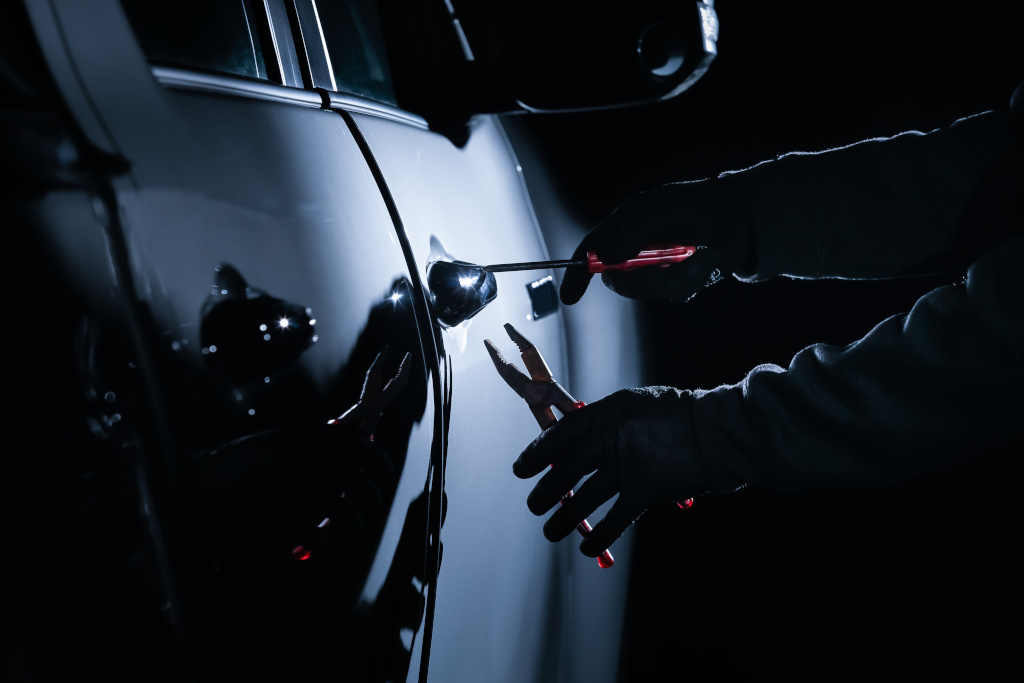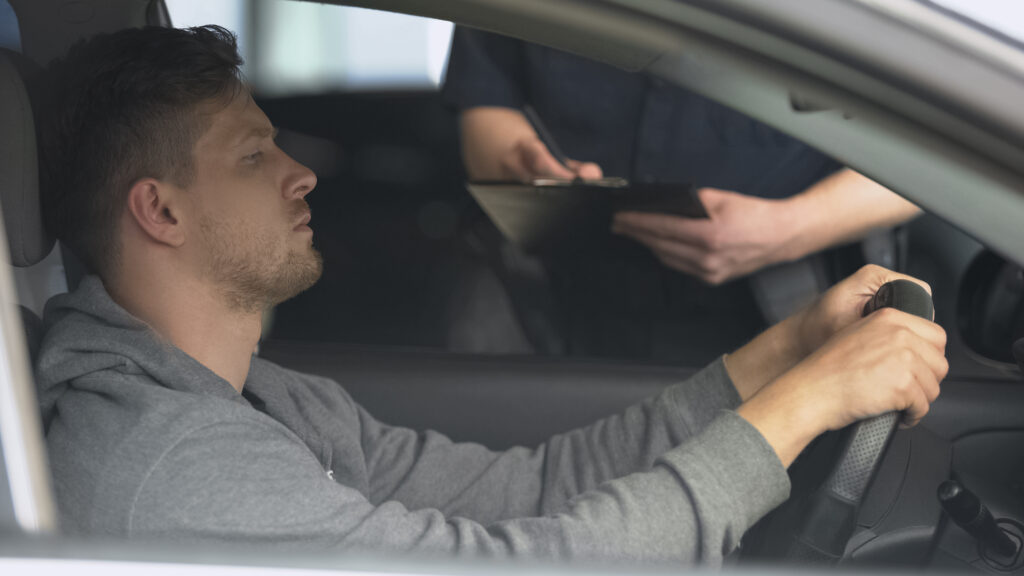Picture walking out to your car in the morning to go to work, but it’s gone. Now what? This can make you feel helpless or even anxious. You might also be wondering whether your auto insurance will cover it.
In this article:
- How insurance handles vehicle theft
- Personal belongings are not covered
- What to do if your car is stolen
- How to avoid car theft
- Frequently asked questions
How Insurance Handles Vehicle Theft
Car thefts are a real problem all over the country. According to the Insurance Information Institute (III), 810,400 vehicles were stolen in 2020. If this happens to you, your coverage may be able to save the day. However, it depends on the type of coverage you have.
Comprehensive, one of the three insurance types you need to have “full coverage,” pays for any losses that don’t involve a collision. This includes theft. If you have this coverage on your policy, your insurer will cover the loss of your vehicle.
If you need transportation after your vehicle is stolen, rental reimbursement coverage can help. It will pay for you to either rent a car or take public transportation until you get a new ride or your old one returns. You won’t need to pay a deductible and it will only kick in if you file a comprehensive claim.
When a criminal steals your vehicle, there are two outcomes:
Police Never Recover It
If the police never recover your vehicle, your insurer will treat it like a total loss. This means that they’ll pay you a lump sum cash amount. You’ll receive an amount equal to the actual cash value (ACV), instead of replacement cost The actual cash value is what a car is worth today, not what it was when you first bought it.
Police Find It
In a situation where the police find your car, things will play out differently. You’ll get it back if there’s no damage. However, if it has any damage, your comprehensive coverage will take care of it. All you’ll need to do is pay your deductible (the amount you pay if you file a claim).
If any car parts or components are stolen or damaged, your insurance should cover them. Here are examples of auto components that a crook could target:
- Catalytic converters
- Locks (to break in)
- Upholstery
- Ignition system
- Windows
- Glove box
- Stock or aftermarket equipment: radio, GPS, stereo, wheels, etc.
Personal Belongings Are Not Covered
It’s a common misconception that, after a break-in or theft, your auto insurance will cover your personal property inside. But it doesn’t cover these items. Rather, your homeowners or renters policy takes care of this as long as you have personal property coverage.
Homeowners and renters insurance cover your personal belongings no matter where they are. These would be objects that aren’t part of your vehicle in any way. Here are some examples of what would count:
- Cell phones
- Jewelry
- Tools
- Computers
- Sports equipment
- DVDs and CDs
- Clothes
It’s important to know exactly what items you keep in your car at all times. If you experience a break-in or theft and notice items missing, you’ll need to file a separate homeowners or renters claim.
What to Do If Your Car Is Stolen
After your vehicle goes missing, it’s easy to let stress and anxiety overwhelm you. But it’s very important to keep calm so you can handle the situation. Below are key steps you should take after someone takes your car:
Know If It Was Actually Theft
When your car isn’t where you left it, crime isn’t always the reason why. Consider these possibilities before calling the police:
- You parked it illegally. If you park in an illegal place, it could get towed away.
- You owe money on the car. In this case, someone could’ve repossessed it without you knowing.
- The police impounded it. There are many reasons why your vehicle could be sitting in an impound lot. Be sure to ask the police about it before reporting a crime.
Call the Police
You should call the police as soon as possible. To help them find your car, be ready to give the following info:
- License plate number
- Vehicle identification number (VIN)
- Type of car (make, model, year)
- Where and when you left it
- Whether it has a GPS, telematics, or another kind of tracking device to help locate it
File a Claim with Your Insurer
The next step is to file a claim with your insurance provider. You should be able to file online or over the phone with your company. Be sure to give them as much information as possible. This will allow them to properly settle it.
Also, be ready to file a separate homeowners or renters claim if you lost any personal items in the car. You may need to provide a list of each item so that the adjuster can give you the right settlement.
Alert Your Lender
If you’re financing your vehicle, you’ll need to tell your lender about the theft. In the event that the police can’t find your car, you’ll still need to pay back every penny you borrowed. Luckily, adding gap coverage to your policy pays the remainder of your loan balance.
Be Ready for Whatever Happens
It’s best to prepare yourself for whatever comes next. There’s a real chance that your car will be gone forever. However, the police could also find it in perfect condition. Be aware that, in general, insurers will treat it as a loss if nobody finds it after three days.
Since vehicle theft is out of your control, you shouldn’t worry about how it’ll affect your premium. However, your rates may go up if you received a discount for not filing claims. Either way, you shouldn’t avoid filing one for a missing car because of how much it’d cost to replace it.
How to Avoid a Car Theft
While thefts are out of your control, there are still steps you can take to lessen your risk. Here’s what you can do to prevent someone from stealing your vehicle:
- Lock the doors. This seems obvious, but it’s a common mistake people make. Always make sure to lock your doors. It never hurts to double-check!
- Never leave the car running without being in it. If you do this, someone could easily get in and swipe it.
- Don’t leave your keys out. Always keep your keys with you or in a safe place. A crook could easily take them and steal it if you leave them out in the open.
- Park in safe, well-lit places. Avoid parking in a dark, unsafe area where someone could break in or tow your car without anyone knowing. Parking your vehicle in a safe place is a best-practice.
- Install anti-theft devices. An alarm or a steering wheel lock can go a long way toward stopping anyone from stealing your car. You could also get a discount for any installed anti-theft devices.
- Don’t leave valuables in your vehicle. Keep your car “dealer clean” and avoid leaving any valuable items inside. A thief could see it and “just have to have it” by breaking in.
- Always be aware. Keep an eye on your surroundings. If you see something suspicious, don’t hesitate to call the police or get out of there.
- Make it hard to tow your car. Blocking the front of your vehicle by parking in front of other objects can stop someone from trying to tow it away.
Frequently Asked Questions
How much do I get from my insurer after my car is stolen?
In most cases, you’ll receive the actual cash value (ACV). Your car depreciates as soon as you buy it. This means it’s worth less now than before because of things like wear and tear, use, and age. The ACV is your vehicle’s replacement cost, minus depreciation.
You’ll also need to pay the deductible before you get your settlement. For example, if your vehicle’s ACV is $25,000 and your deductible is $1,000, you’d net $24,000.
Does my car insurance cover catalytic converter theft?
If you have comprehensive insurance on your policy, your provider will pay to replace your catalytic converter if someone runs off with it. Insurers consider these devices to be a part of the car. If a thief takes it, it counts as damage.
If the police recover your vehicle, you should closely inspect it for damages. Be sure to report any that you find, including a missing converter, to your insurer. Doing so will ensure that your provider properly reimburses you.
Does my auto policy cover personal belongings?
No, your auto insurance policy won’t cover any personal property inside the vehicle. Comprehensive coverage only covers damage to or theft of your car. This includes damages to parts like your catalytic converter, upholstery, locks, and windows.
Your homeowners or renters policy covers any valuables. For instance, if you left your laptop inside the vehicle and a thief takes it, your home or renters coverage would pay for it.
What happens to my rates after I file a comprehensive claim?
Since comprehensive coverage protects you from “acts of God,” your rates shouldn’t go up after you file a claim. However, if you file enough claims in a short time, your rates could increase. Also, many insurers offer a claims-free discount. Filing a claim may wipe that out and result in a higher premium.
If your car goes missing, it’s almost always worth it to file a claim, no matter the impact on your insurance rates. Replacing a vehicle costs thousands of dollars. For this reason, it makes sense to file.
What happens if stolen car is found after insurance payout?
Should authorities find your vehicle after your insurer has paid your claim, it’s no longer your car. It’s now the property of your insurance company and they can dispose of it any way they wish. This may not seem fair, but once you’ve been compensated you no longer have a say in the matter.


